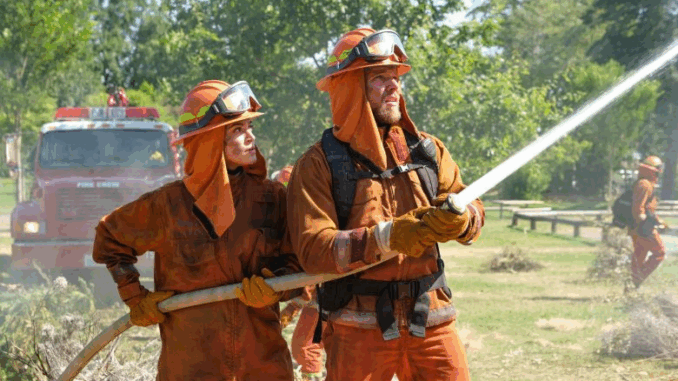
In a simpler time before streaming services, I used to come home from a long, hard day of school, flop on the couch, and flip on the TV. My media diet at that time consisted mostly of reality competition shows (“Hell’s Kitchen,” “America’s Next Top Model”) and the medical and crime procedurals that ran endlessly across multiple channels (“Bones,” “House,” “Criminal Minds”).
Since losing access to cable, I’ve spent a lot more time watching limited series and prestige dramas on streaming services. But I re-entered the world of network procedurals to watch “Fire Country,” a CBS drama about firefighters in rural northern California.
The drama, which began its fourth season in October, follows Bode Donovan (Max Thieriot), who hopes to reduce his felony sentence for armed robbery by serving in one of the state’s Conservation Fire Camp programs. But when he gets sent to Three Rock Con Camp outside his fictional hometown of Edgewater, he is also forced to confront his past.
This dynamic is further complicated by the fact that his estranged parents, Vince (Billy Burke) and Sharon Leone (Diane Farr), are the local battalion chief and fire division chief, respectively. His former friends, Eve (Jules Latimer) and Jake (Jordan Calloway) are also firefighters, and members of Vince’s battalion.
Like any good procedural, each episode centers around a new emergency that threatens the population of Edgewater and its surrounding environs. Of course, fires are the main problem, but the put-upon crews are also called in to deal with mudslides, earthquakes, train derailments, avalanches, chemical spills and even a few hostage situations. Coming up with new and exciting disasters seems to have taken up most of the creative energy of the show runners, and it doesn’t take too long for the emergencies to strain credulity. Though maybe we should give them credit for waiting a whole 27 episodes before introducing the first fire tornado.
Of course, any TV procedural’s representation of its field should be taken with a bucket of salt – though I have a friend who insists she’d let any cast member of “Grey’s Anatomy” perform surgery on her (I think she’s crazy). When the show was first released, Cal Fire released a statement disavowing the show as a “misrepresentation” of both fire departments and the Fire Camp program. One Cal Fire union local even attempted legal action to prevent the show from airing.
I decided to give “Fire Country” a try because of its focus on California’s Conservation Fire Camps. The program employs nearly 2,000 incarcerated firefighters in 35 camps across the state. They’re also the source of considerable controversy. Participants gain valuable job training, the possibility of a reduced sentence, and a potential career path after they are released. But they are also sent to the front lines of dangerous emergencies and earn between $5.80 and $10.24 per day for their efforts.

Unfortunately, “Fire Country” glosses over any ethical dilemma these programs might present and avoids discussions of mass incarceration, systemic injustice, or reflections on the dystopian reality that drives the show. This isn’t “The Wire,” after all. Instead, the series settles for generic platitudes. The incarcerated firefighters are treated sympathetically but without particular depth. The exception, of course, is Bode, who is so tragically heroic, righteous, and noble that I found it genuinely hard to like him (though I doubt that was the show’s intent).
I was also curious about how the show would address the issue of climate change, which is responsible for increasing the number and intensity of wildfires in California and across the United States. A 2022 study found that less than three percent of scripted media included references to “climate-related keywords” and only 0.6% contained the words “climate change.”
With a topic so inextricably tied to global warming, I was interested to see what kind of climate narrative the show would present. In a world where an episode’s air date was postponed due to the raging wildfires in Los Angeles last January (well outside the state’s traditional “wildfire season”), surely it ought to be a theme in the series. “Fire Country” does occasionally nod to the importance of wildfire preparedness and makes other quiet references to our new climate reality. But the show’s most honest appeal comes from watching things – from landscapes to relationships – burn down.